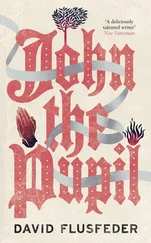They had met for the first time on the Bowery. George was walking back to his lodgings from the newspaper office to wash and change before setting out for the weekly meeting of the Moral Reform League at Mr Green’s townhouse on Fifty-Third Street. An Irish urchin running pellmell through the crowd collided with George Pagan, who held him, looking for the purse in his pale hand, the pursuing robbed gentleman. The boy’s hands were empty and the only pursuer was a young lady, who smiled at George as she took hold of the urchin. The child twisted and struggled and wept and surrendered. George asked if he should fetch an officer. Her amused eyes reached straight into George to a place that he had no prior acquaintance with or even knowledge of. She told him she was the child’s teacher, bringing her charge home.
‘This happens at the end of every day. He tries to run back to school. It is my task to persuade him home.’ She stroked the child’s hair and brow. His shoulders relaxed. She wiped the tear tracks off his face. She whispered to him, comforting words to the melody of a Congregationalist hymn, and George was startled by a stab of jealousy for this child, who could so unthinkingly provoke such actions of heart and hand.
‘This is surely a novelty,’ George said. ‘I would have thought it a unique case, a schoolboy that cannot bear to be absent from school.’
‘We fail the ones who love us best. Education affords a glimpse of somewhere else, a preferable place, without always offering a way there.’
And then, with that quality of quickness that would always so enchant George Pagan, she interrupted his considerations of a reply with a curtsy, as if the drab crowded street were a débutante ball. ‘Mary Johnson,’ she said.
‘George Pagan. At your service.’
‘Good afternoon, George Pagan,’ she said, and, businesslike, she led the spent, unresisting child to his unwelcome door.
Mary lived, as Mr Stone would later remark, in the perpetual now. Everything moved fast with her as if without precedence or consequence: her decisions, her wit, her curiosity. Where George’s understanding crabbed from ignorance to knowledge, dimly inching through objections and inconsistencies like a blind man tapping along a nighttime street, the speed of her attention annihilated the distance between darkness and light.
Her pastoral task achieved, she seemed unsurprised to be walking in step up Second Avenue with George Pagan, and her consent to accompany him to the meeting at Mr Green’s was only slightly more miraculous than his boldness in issuing the invitation.
At Mr Green’s townhouse on Fifty-Third Street, the congregants drank tea and lemonade from Mrs Green’s pale blue china. Marriage rights were discussed, and the liquor question, and universal suffrage was allowed, and slavery abolished, and faith-healing argued for and against, while Mrs Green poured tea, and the philanthropist Mr Green blinked merrily at the enthusiasm in his parlour, but for Mary this was never going to be quite enough. Speed of progress, if only in talk, had to keep up with the quickness of her heart.
No photograph could picture her. In photographs—taken at the end of the Prince Street school year, three short lines of pupils and staff, or at the penultimate meeting of the Reform League at Mr Green’s, or at their wedding, with her preacher father already standing aloof from his unmanageable daughter—her slim face looked pinched and narrow, her chin and brow too mannishly strong, her eyes wide and impatient. George looked at his best in photographs. His strongly carved features became sculptural, implying all the power he knew he lacked in life. Mary’s vivacity charmed and beautified everything around her. Later, he would encounter the ferocity of her temper, which—until events gave her greater opportunity for remorse—was the ashamed subject of her largest self-reproach, flaring with a sudden heat, but then, as abruptly, it would dampen, abate, the flames clearing, her true nature revealed again, unscorched, her good fellowship and ardour and sympathy reestablishing themselves as the ruling agents of her passions.
Конец ознакомительного фрагмента.
Текст предоставлен ООО «ЛитРес».
Прочитайте эту книгу целиком, купив полную легальную версию на ЛитРес.
Безопасно оплатить книгу можно банковской картой Visa, MasterCard, Maestro, со счета мобильного телефона, с платежного терминала, в салоне МТС или Связной, через PayPal, WebMoney, Яндекс.Деньги, QIWI Кошелек, бонусными картами или другим удобным Вам способом.












